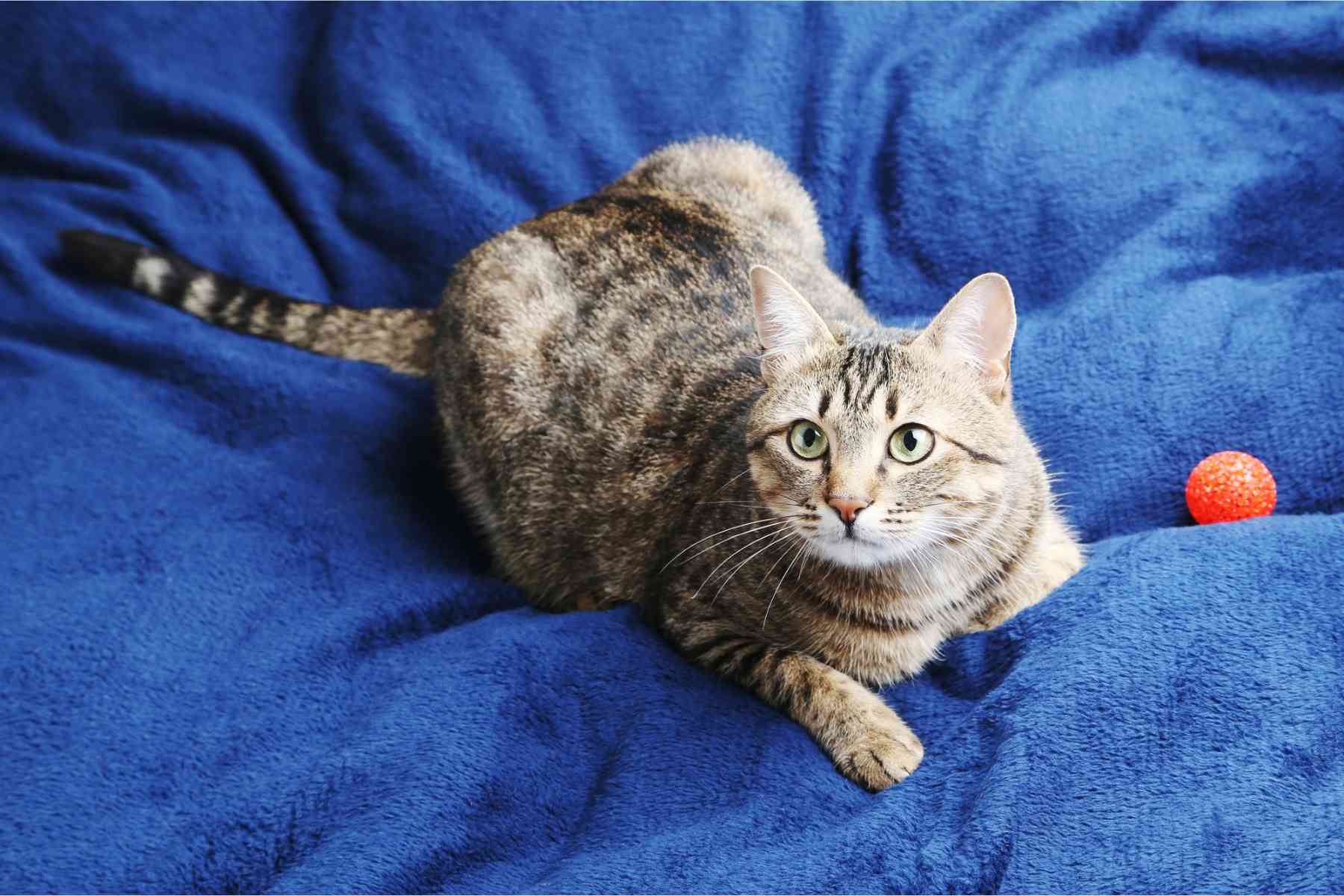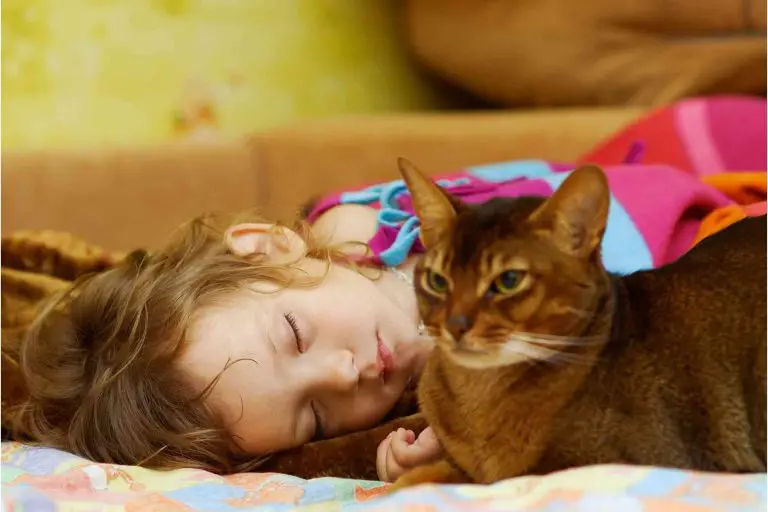Why Does My Cat Bring Me Toys at Night?

By nature, cats are hunters and crepuscular animals – more active in the dawn/dusk than the day. If your cat brings you toys at night, it’s probably following its instinct to hunt and catch prey. While some cats catch real prey, many domestic cats “catch” items like toys or balled-up socks from around the house. By bringing them to you, they are “sharing” the prey with you.
In this article, I’ll look at this and many other reasons your cat brings you toys at night, what might be going on with your cat, and how you can gently train them away from nighttime antics that wake you.
There is some debate over whether cats are crepuscular animals (most active at dawn/dusk) or nocturnal animals (most active at night.) This can also vary among individual cats.
The dawn period can start around 3 am. Most cat owners are familiar with the scenario of their cat waking them up around 3 am: it’s common.
If your cat is bringing you toys at night, especially if they wake you up, they probably feel most active, alert, and ready to hunt at night.
If the Toy Is “prey”, what Are They Doing with It?
Cats in the wild will catch prey and bring it back to a safe place to eat it. If the cat is enacting hunting behavior with the toy, they may bring it to a safe place, like your bed.
They may also be giving you the “meal” of the prey, or be “hiding” it by moving it around the house.
They could also be “teaching” you about prey, the way a mother cat would show what she has caught to her kittens to train them.
Are There Other Reasons My Cat Brings Me Toys at Night?
There is speculation about other reasons cats are active with toys at nighttime. Some of the possible causes are:
They Want Attention
If your cat wakes you up, it may be repeating a behavior it has learned to get your attention.
They Feel Like Playing
Your cat might be looking for things to play with, especially if it’s a cat that feels most active at night.
Some cats play fetch: according to Pet MD, the Burmese breed of cat loves to play fetch. The cat may have learned that you will throw it for them if it brings you a toy.
They Have Been Bored or Lonely in The Day
Your cat might not be getting enough play during the day. This can be an issue if the cat is an inside-only cat, or if you are out at work much of the day. Their environment may not be giving them enough stimulation or enrichment.
They Are Coping with Anxiety
Some cats like to suck on furry textured things to calm themselves. It mimics the action of nursing when they were kittens. They may bring a furry toy into your bedroom or bed because it’s a safe space for them.
It’s Fun
When you’re asleep, particularly in the early hours of the morning, a cat may not only bring you toys, but also jump on your toes, paw your face, or push things off your bedside table. All this is fun – maybe even more fun when the cat gets a reaction from you!
It’s Rewarding
Perhaps you get up and feed the cat, let them in or out, pet them, or play with them. Even negative attention (if you shout or scold the cat) can be valued by your cat.
They’re in A Routine
If it was fun once, your cat will do it again. After a while, bringing you toys or other night behavior may just become part of the cat’s routine, part of what it sees as its nightly “job”.
What’s Wrong with My Cat?
According to leading cat behaviorist Jackson Galaxy, bringing toys and getting up to other nighttime antics are actually normal behaviors.
Domestic cats simply feel the urge to hunt at times of the night when mice and rats, their primary prey, are active.
How Can I Stop My Cat from Waking Me with Toys at Night?
According to cat behaviorists, to settle a cat’s nighttime behaviors down, you need to look at the cat’s activities and routines during the day.
Is My Cat Lonely in The Day?
While cats are more solitary animals than dogs, they still need engagement with the wider world. If you are gone for long hours, they may need more time with someone.
You could perhaps enlist a friend or neighbor to spend some time with your cat each day. Dog walkers may also be willing to be engaged to spend some time with your cat.
Does My Cat Need More Play?
Leading cat behaviorist Pam Layton-Bennett says she sees attention-seeking behaviors in cats most often when they aren’t getting enough stimulation, play, enrichment, or being left alone for long periods in the day.
Cats are intelligent and curious animals. They like to investigate, experiment, and learn.
Buy some toys, which the cat can play with on their own. These include small soft toys, feathery toys, toys with bells or other sounds, and toys with balls fixed in tunnels which they can paw. Also, there are some great battery-operated toys for cats: some have moving or flying sticks that simulate prey’s movements.
There are also inexpensive tunnels for cats, and don’t forget the good old cardboard boxes.
Rather than putting out too many toys, put one or two out per day and change them.
Buy some toys which you and the cat can play with together. The best are stick or wand toys with a string and a “bird” or “mouse” on the end, which feels stimulating in the cat’s mouth.
Don’t leave toys that have a string with an unattended cat, as they can quickly get it wrapped around their necks.
Get a Routine Going
Set up a routine of playing active games with your cat in the morning and evening, about an hour and a half before you go to bed.
The play should be enough to tire them, without making them overly exerted or frustrated. Fifteen minutes is often about right, but take your cat’s health and age into account.
Allow them to “catch” the toy many times. Near the end of the play session, you should make the “prey” move much more slowly and less active. This signals to the cat that they are near to “killing” and eating, which you will supply by feeding them.
After the play, then feed the cat. This mimics the natural pattern in the wild.
Allow the cat to groom themselves.
Take the cat to a quiet place with you, such as the couch or bed. Stroke them and encourage them to relax and sleep.
Ignore the Nighttime Behavior
This is the most challenging step: stop reacting in any way to their nighttime behaviors. This may be very difficult! It may help to know that it sometimes only takes three or four nights to change a cat’s pattern, especially if you provide a much richer play environment in the daytime.
Address Anxiety
If you think anxiety is a factor for your cat, you might try a plug-in pheromone diffuser. These can work wonders in settling down an anxious cat.
If you have serious concerns about anxious behavior in your cat, talk with your vet.
Provide Nighttime Toys and Window Spots
Put out a new selection of toys at night (without showing your cat). If they are roaming at night, they may use their energy upon the toys.
Also, leave blinds or curtains open on some windows where they can see passing cars or other nighttime activities.
Leaving a radio on quietly or using a nightlight can also settle cats.






